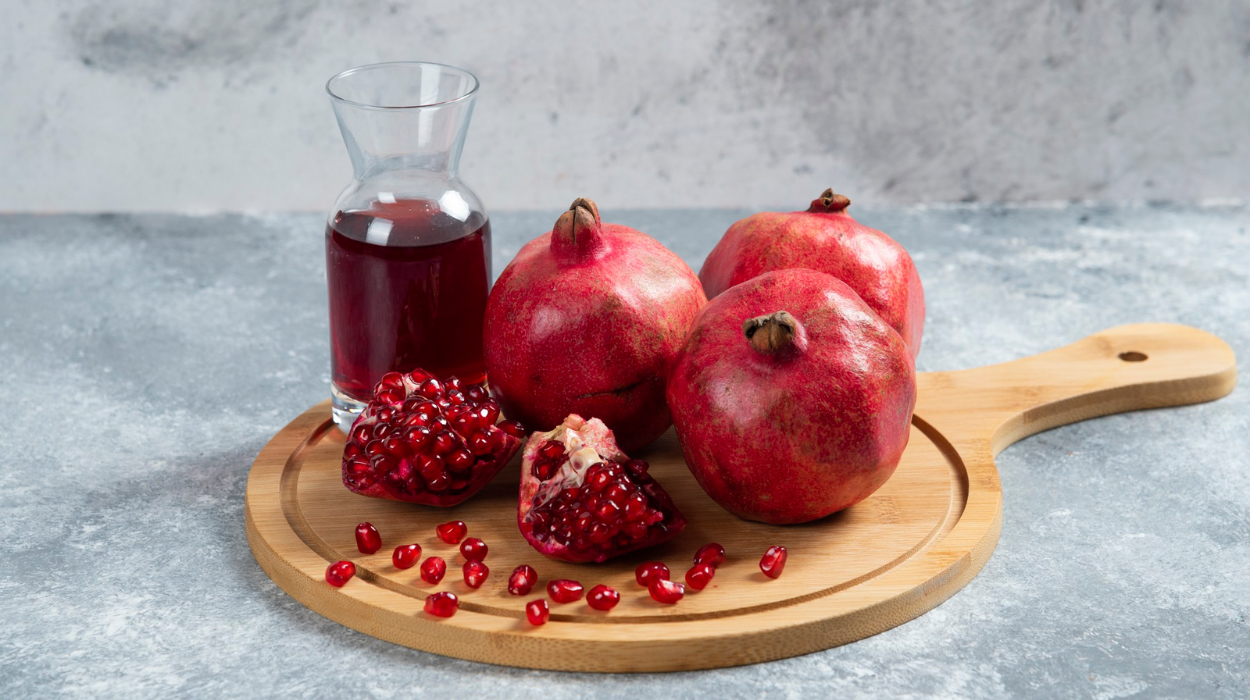Pomegranates are a round, ruby-red tropical fruit native to Iran and Northern India. These days, they are cultivated across the Middle East, the Mediterranean, and the United States. It is popular for its many potential health benefits, but is pomegranate good for weight loss? Pomegranates are versatile, sweet, and easy to incorporate into healthy snacks, making them beneficial for weight loss.
Did you know that one pomegranate contains about 600-800 seeds? Read on to find out how to include them in your diet and so much more.
Is Pomegranate Beneficial For Weight Loss?
Yes, pomegranate consumption can support your weight loss journey. As one of the most delicious fruits out there — they have been shown to improve gut health and boost metabolism. Pomegranates provide a low-calorie, nutrient-dense addition to your diet, helping improve your overall health when eaten as part of a balanced diet.
Is Pomegranate Good For Weight Loss?

Pomegranates are one of the healthiest fruits you could pick up at your local grocery store. They offer powerful nutritional benefits and a low-calorie count, making them one of the best fruits for weight loss. They are often called superfoods because they are nutrient-dense and rich in fiber and potent antioxidants.
Of course, a well-rounded diet includes a rainbow of fruits and vegetables. You’ll want to make sure you are getting your daily requirement of nutrients from various sources. Consider adding fruit and vegetable supplements, too. Be mindful of your portion sizes to create a calorie deficit[1] for weight loss. Incorporate regular physical activity, and talk with your registered dietitian about helpful supplements.
How Pomegranates Can Aid Weight Loss
The pomegranate’s edible seeds are called arils, and they have a juicy and sweet taste. Their nutritional content aligns with a healthy, balanced diet. While they don’t magically burn fat, they can help you lose fat over time — making pomegranate for weight loss a good addition to your weight loss journey.
Eating pomegranate seeds is not a magic solution for public health, but they can support weight management efforts through several mechanisms:
Dietary Fiber
Pomegranates have dietary fiber,[1] which keeps you satiated and feeling full for longer. This can help curb cravings and prevent you from overeating later. The daily recommended fiber[2] intake is 38 grams for men and 25 grams for women. Half a cup of pomegranate arils contains about 3.48 grams of fiber,[3] helping you consume a significant portion of your daily recommended intake.
Low Caloric Content
Pomegranates are also low in calories. Pomegranate seeds can help promote weight loss. Half a cup of pomegranate seeds contains 72 calories,[3] providing a sweet fix without excessive calories.
Antioxidant
This superfood is rich in potent antioxidants, which protect your body by neutralizing the effects of oxidative stress[4] that damage the cells in your body. Saturated with antioxidants, pomegranates can support a healthy immune system and metabolism. Similarly, green powders can also give you an extra nutrient boost.
Antioxidants found in pomegranates include:
- Punicalagins: A type of complex polyphenol unique to pomegranates and pomegranate juice that acts as a potent anti-inflammatory[5] for your body.
- Ellagic acid: A simple polyphenol found in many fruits, vegetables, and nuts, such as raspberries, strawberries, and walnuts. It boasts anti-inflammatory properties and anti-cancerous, antimicrobial, and cardiovascular[6] health-promoting properties.
More Benefits Of Pomegranates

The benefits of pomegranate consumption extend far beyond weight management. Besides their potential to help in weight loss, pomegranates contain minerals, vitamins, and antioxidants that can improve your health.
Sexual Health
Some of the polyphenol compounds in pomegranates have been shown to help women with polycystic ovary syndrome. Studies have shown that pomegranate juice can benefit high blood pressure and improve blood lipid levels[7] in women with PCOS. Research has also linked pomegranate supplements with improved menopause symptoms.[8]
Skin Health
Studies have shown that pomegranates help fight against oxidative stress, which may support anti-aging efforts. Polyphenols and anthocyanins neutralize the effects[9] of free radicals, which can protect you from premature aging, giving you a more youthful appearance.
Hyperpigmentation of the skin[10] may also benefit from pomegranate extract peel. The bioactive compounds in the peel have antioxidant, anti-inflammatory, and skin-brightening properties.
Digestive Health
Pomegranates are rich in soluble fiber,[11] which can help lower your cholesterol and regulate blood sugar levels. They also contain insoluble fiber, which helps maintain regular bowel movements and prevent constipation.
When you consume pomegranate arils, you may also experience improved gut health. The fiber acts as a prebiotic and helps balance the bacteria in your gut, which is key for good digestion.[12] It protects you from harmful microorganisms, and studies show that pomegranates have anti-bacterial and anti-fungal[13] properties.
It also helps you to absorb nutrients correctly and maintains a healthy immune system.
Research also shows that symptoms of acid peptic disorders[14] can be improved with pomegranate extract.
Furthermore, pomegranates have been shown to improve high-density lipoprotein cholesterol, or good cholesterol, and reduce your low-density lipoprotein cholesterol, or bad cholesterol, in patients with non-alcoholic fatty liver disease.[15] The same research found that consuming pomegranate extract can increase insulin resistance and reduce the same population’s body weight and waist circumference.
Antioxidant And Anti-Inflammatory
Pomegranates may have an anti-inflammatory effect[16] due to their antioxidant properties. Inflammation is linked to several chronic diseases, including obesity and heart disease. By reducing inflammation and neutralizing the effects of free radicals, pomegranates can help protect bone cells[17] and encourage better bone health.
Pomegranates are also a great source of vitamin C, a crucial vitamin known to improve your skin[18] by stimulating collagen. Vitamin C also has immune-boosting properties[19] and can help produce antibodies.
Clinical evidence also suggests that those who drink pomegranate juice may experience a reduced risk of breast cancer.[20] Polyphenols may have a preventive effect on estrogen and testosterone levels.
Men also benefit from pomegranates, as research suggests they offer preventive properties for prostate cancer[21] and other cancers.[22]
Good For Your Heart
Adding pomegranate to your well-balanced diet may reduce your risk for[23] heart disease by reducing inflammation. Pomegranate antioxidants, such as polyphenols and anthocyanins, have been linked to better cholesterol levels and might help lower blood pressure.[24] Proper functioning of your vital organs — heart, brain, and muscles – may be improved by consuming pomegranate. Efficient blood flow means that nutrients and oxygen are delivered effectively to your organs and tissues.
Ways To Include Pomegranates In Your Diet
Pomegranates are a nutritious addition to healthy snacks, salads, appetizers, and desserts. Check out some ideas below:
- In salads: You can sprinkle pomegranate arils, as they go great with feta cheese and leafy green spinach.
- In a mixed fruit bowl: Add pomegranate to a medley of sliced fruit for added flavor, texture, and extra nutrients.
- Pomegranate molasses: This fruity syrup is a lovely addition to sweet and savory dishes. You can get creative and try drizzling it on yogurt, mixing it in salad dressing, or putting it in a marinade for lean cuts of meat.
- Hummus: Pomegranates go well with hummus and mixed herbs, creating a fresh and unique burst of sweetness.
- As a topper to roasted vegetables: Roast some vegetables, such as zucchini, aubergine, and onion, and top them with pomegranate and a sprinkle of cheese.
- Mixed in with rice: Add a new dimension to your rice dishes by mixing in pomegranate and herbs. The sweet and salty mix is a great side dish.
- Juiced: Fresh pomegranate juice has many health benefits. If you don’t have a juicer at home or the time to make it, you can usually find pre-made juice in your local store.
Potential Risks
While eating pomegranates has many potential benefits, it’s important to be aware of potential side effects as well.
- Allergies: Although uncommon, some people might experience allergic reactions to pomegranate. Symptoms could include swelling, itching, or difficulty breathing.
- Interactions with medication: Pomegranates may interfere with certain medications[25] taken for blood thinning or clotting, such as statins, calcium chain blockers, and anti-depressants. Consult your doctor if you take any medications before adding pomegranates to your diet.
- Carb content: Although pomegranates contain a relatively moderate sugar level compared to some other fruits, it’s still good to be aware of how much sugar you consume. Too much sugar intake can lead to weight gain and other health problems.
- Calories: Be mindful of eating pomegranates in moderation, as eating them excessively or drinking too much juice can increase your caloric intake.
Conclusion
In summary, pomegranate consumption can help you lose weight and add many nutritional benefits to your diet. However, they aren’t a magical solution to losing weight. You want to aim for a well-balanced diet rich in fruits and vegetables, whole grains, and lean proteins to achieve your long-term goals.
Eating pomegranates has numerous potent health effects, including their anti-inflammatory properties and potential to aid heart health. They are a great fruit to add to a balanced diet; however, it’s important to be mindful of your portion sizes.
Your journey to losing weight should include regular exercise and a well-balanced diet that includes a variety of nutritious foods. Pomegranates are tasty and can add new flavors to your meals while supporting your health and weight loss goals.
Frequently Asked Questions
No specific studies show that pomegranates burn belly fat. If you want to achieve weight loss, you will reach your goal by eating a balanced diet, prioritizing regular exercise, and managing your calorie intake.
It’s not a guaranteed weight loss solution, although it contains antioxidants that offer other health benefits. Juice contains sugar and calories, so moderation is key.
There is no specific amount that will create weight loss. Moderation is key, as creating a calorie deficit will help you to lose weight.
 Evidence Based
Evidence Based
